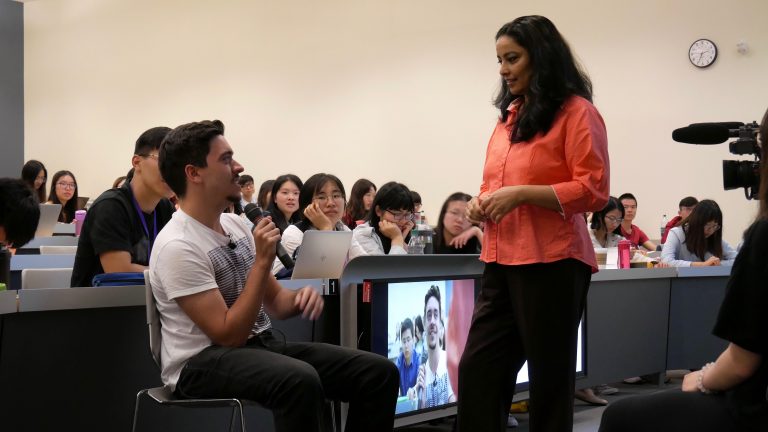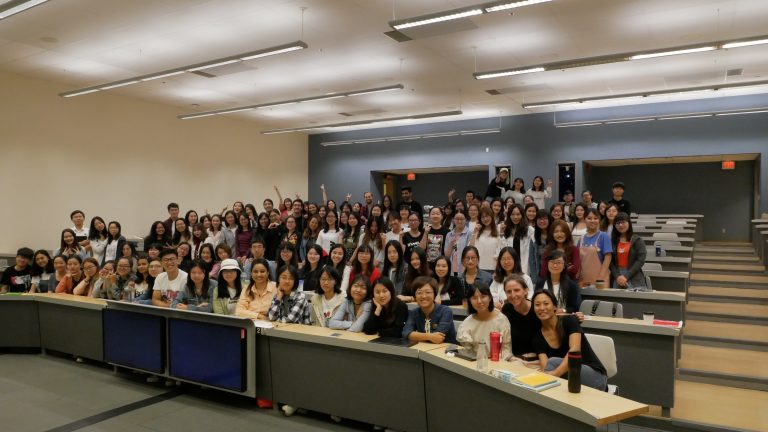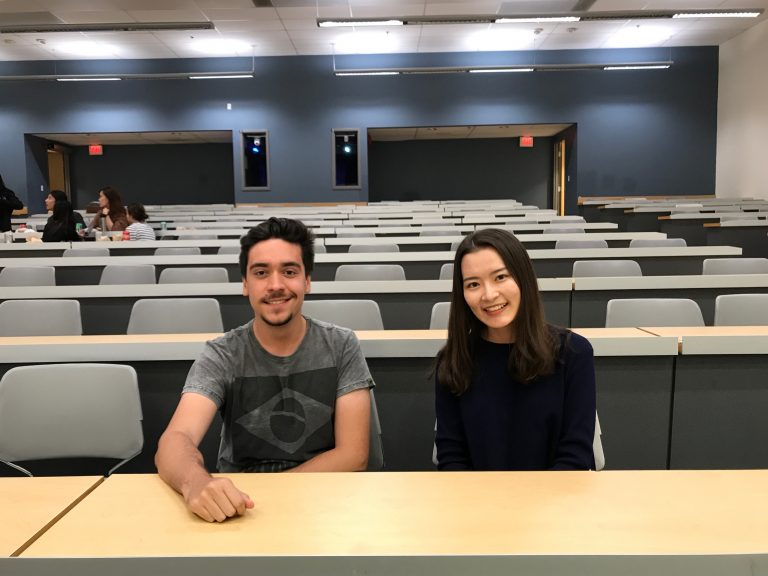Halfway through one of her journalism lectures, instructor Anu Sandhu Bhamra walked over to her bag and slipped on a pair of sunglasses as her 106 students watched on.


Instructor Anu Sandhu Bhamra, right, practices an interview with student João Pedro Correia. Credit: Emi Tasaka
The glasses stayed on for half an hour as students raised their eyebrows and exchanged glances.
Finally, Sandhu Bhamra asked the class why no one had questioned her costume change.
“The number one answer I was looking for, which I gladly got, was assumption. They assumed that something was wrong with my eyes,” Sandhu Bhamra recalls.
“Even so, you had to ask me why I was suddenly wearing my sunglasses. You saw at the start of the class that my eyes were fine.”
Sandhu Bhamra stresses two skills to her students: critical thinking and challenging authority.
It’s a big learning curve for the international cohort, who are wrapping up their final days of UBC’s four-week Vancouver Summer Program.
The academic summer school, which runs July 15 to August 15, lets international students take two 39-hour UBC courses and get a taste of Canadian society.
This is the fourth year that the UBC School of Journalism has participated in the Vancouver Summer Program, Package B: Global Journalism, Culture and Communications: Practice and Principles.
The students — who come from international partner universities — tend to enter the program with limited confidence in their English and a textbook approach to their studies.
‘Language is a tool. It’s not wisdom’
It’s an even weightier challenge in Sandhu Bhamra’s Global Journalism class, where 90 per cent of the students come from non-journalism backgrounds.
“Language is a tool. It’s not wisdom,” emphasizes Sandhu Bhamra, who graduated from the UBC School of Journalism in 2009.
“I tell them, I have an accent, we all have an accent. If you’re too tongue-tied just because of your language complexes, you can’t really function as a journalist.”


The Global Journalism class in the Vancouver Summer Program has 106 students, most of whom come from non-journalism backgrounds.
Over the four weeks, students dive into the basic facets of journalism: Observing their surroundings, pitching a story, writing a lead, taking photos. Their work culminates in a final multimedia project presented to the class.
It’s a “slice of how journalism is treated in Canada,” Sandhu Bhamra says.
The goal, she adds, is to foster better communicators in every field.
“I have two medical students in the class. I taught them about getting detached with their subjects and still having empathy — not treating their subjects like mere objects.”
“That quality is transferable in every sphere of life.”
‘It’s been about courage’
Jiawei Chen began her “journey of observation” on the first day of class.
“When we walked in and Anu asked us what we saw on the way, no one had any answer at that time,” says Chen, a second-year student at the Communication University of China in Beijing.


João Pedro Correia, left, and Jiawei Chen say they’ve learned to be observant and think more about diversity in the media. Credit: Alex Migdal
“We were not paying attention and always taking things for granted.”
After a stop to the bathroom during class, Chen came back with detailed notes about its location and the vending machines inside.
“It helps you find stories,” says her classmate, João Pedro Correia, a third-year student at Cásper Líbero College in São Paulo, Brazil.
Both students have picked up on some key tenets in Canadian journalism.
“People emphasize storytelling here,” Chen says.
“Back home, we focus on the events and tell people what the event is about. But here, people are always the core of a story. You have to find your one strong subject.”
Correia says he appreciates the greater emphasis on diversity in Canadian journalism, including a focus on Indigenous issues. There are still problems, he notes, but journalists are more cognizant of them.
“It’s something I want to bring back,” he says.
Sandhu Bhamra says she’s admired the eagerness and bravery of her students — including Chen and Correia — over the four weeks.
“It’s been about courage. Most of them said they feel more confident.”
“Students walk up to me now and say, I want to do a major in journalism,” she adds. “That’s been my biggest reward.”


